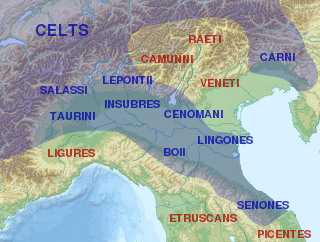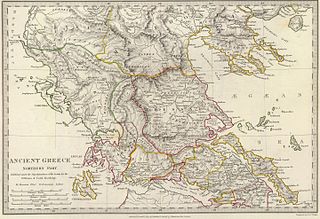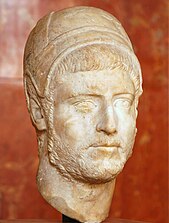
The Taurini were a Celto-Ligurian tribe dwelling in the upper valley of the river Po, around present-day Turin, during the Iron Age and the Roman period.

The vigintisexviri were a college (collegium) of minor magistrates in the Roman Republic. The college consisted of six boards:
The interrex was literally a ruler "between kings" during the Roman Kingdom and the Roman Republic. He was in effect a short-term regent.
Oikonomos, latinized œconomus, oeconomus, or economos, was an Ancient Greek word meaning "household manager." In Byzantine times, the term was used as a title of a manager or treasurer of an organization.

The epulones arranged feasts and public banquets at festivals and games (ludi). They constituted one of the four great religious corporations of ancient Roman priests.
The Roman festival of Larentalia was held on 23 December but was ordered to be observed twice a year by Augustus; by some supposed to be in honour of the Lares, a kind of domestic genii, or divinities, worshipped in houses, and esteemed the guardians and protectors of families, supposed to reside in chimney-corners. Others have attributed this feast in honour of Acca Larentia, the nurse of Romulus and Remus, and wife of Faustulus. During this festival, offerings were made to the dead, usually at altars dedicated to Acca Larentia. A sacrifice was typically offered in the Velabrum, the spot where Acca Larentia is buried. Larentalia was part of a series of ancient Roman festivals and holidays celebrating the end of the old year and the start of the new.
The Secular Games was a Roman religious celebration (Ludi) involving sacrifices and theatrical performances held in ancient Rome for three days and nights to mark the end of a saeculum and the beginning of the next. A saeculum, supposedly the longest possible length of human life, was considered as either 100 or 110 years in length.
The Fornacalia was an Ancient Roman religious festival celebrated in honor of the goddess Fornax, a divine personification of the oven (fornax), and was related to the proper baking of bread.

The Velabrum is the low valley in the city of Rome that connects the Forum with the Forum Boarium, and the Capitoline Hill with the western slope of the Palatine Hill. The name Velabrum may translate to "place of mud." It was believed that before the construction of the Cloaca Maxima, which probably follows the course of an ancient stream, the area was a swamp, though this claim has been disproven by core samples taken from Velabrum in 1994. Ancient authorities state that in this marshy area the roots of a fig tree (Ficus Ruminalis) caught and stopped the basket carrying Romulus and Remus as it floated along on the Tiber current. The place therefore has a high symbolic significance. It was also used as a marketplace and a center of commerce.

The popina was an ancient Roman wine bar, where a limited menu of simple foods and selection of wines of varying quality were available. The popina was a place for plebeians of the lower classes of Roman society to socialise and in Roman literature they were frequently associated with illegal and immoral behaviour.
Andromachus was the ruler of Tauromenium in eastern Sicily in the middle of the 4th century BCE, and the father of the historian Timaeus.
The Boedromia (Βοηδρόμια) was an ancient Greek festival held at Athens on the 7th of Boedromion (summer) in the honor of Apollo Boedromios. Though Apollo was referred to as Boedromios by the Boeotians as well as other Greeks, the festival was exclusively celebrated by the Athenians. According to Demosthenes, the only classical writer to refer to the festival, it had a military connotation, and thanks the god for his assistance to the Athenians during wars. It could also commemorate a specific intervention at the origin of the festival. Various ancient sources have offered differing accounts on what this intervention may have been. According to Plutarch, Theseus refused to battle against the Amazons until he had sacrificed to Phobos. It is in recognition of the help granted in the ensuing battle that the Athenians celebrate the festival. However, the Suda and Euripides report that the festival's origins lie in the help either Xuthos or his son Ion granted to the Athenians when they were attacked by Eumolpos during the reign of Erechtheus. During the event, sacrifices were also made to Artemis Agrotera.
Hiempsal I, son of Micipsa and grandson of Masinissa, was a king of Numidia in the late 2nd century BC.

The Perrhaebi were an ancient Greek people who lived on the western slopes of Olympus, on the border between Thessaly and Macedonia. They took part in the Trojan War under Guneus and also fought in the Battle of Thermopylae.
Lucius Roscius Otho was Roman tribune during the year 67 BC. He is most famous for the Roscian law. He was an intimate friend of Cicero who defended his law against the public upset

Auctions in ancient Greece were are events in which goods were sold through an open bidding process between multiple buyers, the highest bidder receiving the goods. In a public auction, goods belonging to the state were sold, whereas private auctions sold goods belonging to individuals and identity of the seller was private. Goods that were often sold at auction include, land, the ability to collect taxes, slaves, seized goods, and inheritances. Auctions have progressed to the exciting event we know today from a very long history that started in ancient Greece.
Titus Otacilius Crassus was a Roman Praetor in 217 BC. He was commander of a fleet in Lilybaeum, that was led in a raid of Africa in 215 and 212 BCE. In 214 BCE Octacilius Crassus stood to obtain the consulship. However, Fabius Maximus critiqued Titus for lacking the necessary skills to adequately serve as consul. Thus depriving Crassus of his consulship. Instead, he received a second praetorship. Alongside a praetorship, Crassus may have been a pontif or augur. Eventually Titus would also go on to be governor of Sicilia. He commanded the Lilybaeum fleet from 213 BCE to 211 BCE, indecisively maneuvering against the Carthaginian admiral Bomilcar.
An imperial estate in the Roman Empire it was the "personal property of members of the imperial family, as distinct from property belonging to the Roman state". On the Emperor's death, these properties passed to his successor, and not to his private heirs.
The Gallic Alps were an ancient cultural region located in the Alps and populated mainly by Gauls. The term Celtic Alps is also found in ancient Greek texts.
Quintus Caecilius Bassus was a Roman equestrian who fought during Caesar's civil war under Pompey before the Battle of Pharsalus. After the battle, he commandeered two mutinous legions in Syria and defended against a Caesarian siege at Apamea. There, he negotiated with Deiotarus, the king of Galatia, and the Parthians. After Caesar's death, both his men and those of his besiegers defected to Gaius Cassius Longinus; Bassus was then dismissed unharmed. He then disappears from history, possibly dying during the Battle of Philippi.







